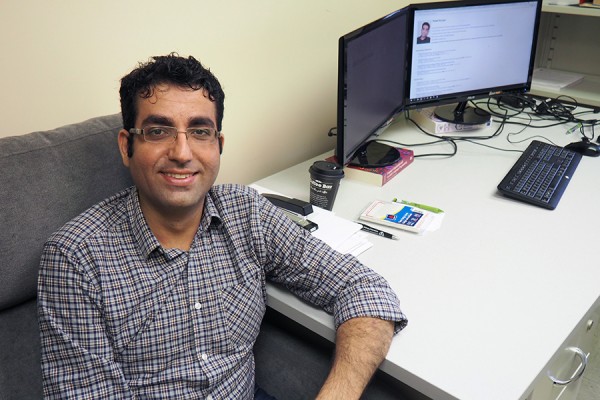 Computer science professor Mehdi Kargar has received a $20,000 NSERC grant toward his work to simplify search through massive datasets.
Computer science professor Mehdi Kargar has received a $20,000 NSERC grant toward his work to simplify search through massive datasets.
When Mehdi Kargar looks at enormous amounts of data collected from multiple databases, he envisions a seamless and fluid directory of information that could one day be organized through an algorithm for quick and easy search.
Unfortunately, this type of complicated — or structured — data is extraordinarily difficult to organize though simple search systems.
Dr. Kargar has received a $20,000 grant from the Natural Sciences and Engineering Research Council of Canada (NSERC) to craft an algorithm that could help sort structured data through a massive search tool, much like Google.
“It may sound simple enough, because people use Google and think search engines already exist to sift through any number of data types,” says Kargar, a professor of computer science.
“We propose to develop a powerful and intuitive search system, akin to web keyword search, for structured enterprise data and our system will empower non-technical users to explore enterprise databases and turn big data into actionable insight, just as Google search has empowered society to explore the web.”
The proposed frameworks would be useful for Canadian and international businesses as well as government institutions who need to sift through large pools of information which contain multiple entries about one entity.
He says the focus is to design effective and efficient methods to explore graph databases, which model structured data, to address important problems and challenges as well as to identify opportunities for improve knowledge exploration.
“None of which is easy, because of the complexity, scale and massive heterogeneity of such data,” Kargar says.
He says his team will investigate ways to identify a user’s intention when searching through structured data.
“Most of the current work in this area focuses on finding answers quickly, rather than finding more meaningful answers,” he says. “We want to improve search quality by investigating the role of keyword search.”
Kargar joined UWindsor’s School of Computer Science a year ago and says creating such a search tool is years in the making. In the meantime, the research will train graduate students in databases and data mining to help them in the academic or industrial job markets.
